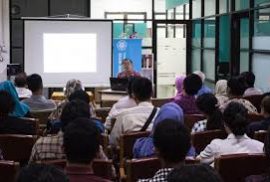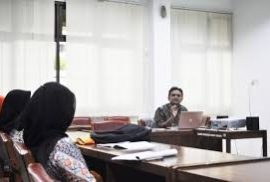On Wednesday (8/8/18), Professor Hak-Soo Kim from the Faculty of the School of Communication of Sogang University in Seoul, South Korea attended the UGM PSSAT Library to provide material about Community & Communication: A New Perspective in SEA Talk # 22.
SEA Talk_eng
On Friday (11/5/18), SEA Talk #21 was conducted on “Corporate Power and Global Governance: Australian Miners in Indonesia” with Lian Sinclair from Murdoch University as the presenter. This topic was based on his fieldwork on Australian Mining companies operating in three different locations in Indonesia namely Kulonprogo, Kutai Barat and Halmahera Utara.
Lian discussed that mining companies tend to be benefited from global governance (UN, WTO, and others) when conflicts with local communities occurred. One of strategy of dealing with those conflicts was CSR (Corporate Social Responsibility). CSR helped the companies to reduce possibility of clash with local societies as they indirectly involved in companies’ management process. However, many conflicts still persisted because of the localities of the problems.
Indonesia as one of the countries that is very vulnerable to natural disasters is considered to require socialization to handle them. In fact, not all sections of society in this country are able to accept the socialization held by the government. Therefore, PSSAT UGM held a discussion titled “Community Resilience on Maritime Disaster in Indonesia” with Dr. Rahman Hidayat, assistant deputy of Assistant Deputy of Infrastructures for Shipping, Fishery, and Tourism of Coordinating Ministry for Maritime Affairs, and Dr. Widjo Kongko at PSSAT UGM Library (16/03/18). The discussion in the afternoon was also attended by Prof. Dr. Judith Schlehe, Professor of Social and Cultural Anthropology at the University of Freiburg, Germany, some researchers from PSSAT, and academics.
As a form of cooperation between CESASS UGM with University of Freiburg, Prof. Dr. Judith Schlehe accompanied by a researcher from CESASS UGM, Vissia Ita Yulianto, shared their knowledge in the form of workshops (08/03/18). The workshop held in the Indonesian Room of CESASS UGM Library presented the topic of waste management which is still one of the problems in Indonesia. This problem is certainly very influential with the stability, including the stability of undersea ecosystems. Therefore, this study took a case study in the southern maritime area of Yogyakarta which includes part of Gunung Kidul Regency under the title “Waste, Worldview, Morality: An Inclusive Approach”.
Every human being has the right to a peaceful life and to freedom. Unfortunately, these two rights are becoming something extremely difficult to obtain for Rohingya people in Myanmar. After session 17 of the SEA Talks where the history and background of the Rohingya crisis was discussed, CESASS UGM organised a new discussion on the issue through the SEA Talks 18 : “Rohingya: International Human Rights Law Perspective” .
Eko Riyadi, M.H. from the Center for Human Rights Studies of Islam University of Indonesia (UII), and Muhadi Sugiono, M.A and researcher for CESASS UGM, were invited to join the SEA Talks discussion as speakers. The cooperation between the Center for Human Rights Studies of UII and CESASS UGM represents a positive sign of active participation from the two institutions that both focus their work on academic studies regarding Human Rights in Southeast Asia.
Myanmar is an Indochina country formerly known as Burma. It has experienced a very long civil war turmoil. Since its independence in 1948, Burma has often faced ethnic conflict that has been criticized by other nations. Aung San Suu Kyi, a statesman who won the Nobel peace prize in 1991, was not considered serious in dealing with the prolonged conflict in his country.
In response to the Rohingya conflict that is currently the world’s attention, and Indonesia, SEA Talks # 17 this time invited Dr. Budiawan, a lecturer in Study Program of Culture and Media of UGM Graduate School as a speaker. The topic presented was “The Rohingya Crisis and the Nationalist-Religious Problems” beginning with the historical tracking of Rohingyas to the assumptions that drive genocide crimes against Rohingyas and other ethnic minorities in Myanmar. This discussion was opened with the exposure of opinion from several Indonesian figures and institutions who asserted that the Rohingya crisis is not only a religious conflict but multidimensional. To quote Dr. Budiawan, “Rohingya crisis is not a religious conflict in the sense of being a conflict let alone solely because of religious differences, but the Rohingya crisis can not be separated from the issue of religious and ethnic differences between ethnic Burmese (Buddhist) and ethnic Rohingya (Muslim).
The discussion on the 411 and 212 rallies in Indonesia never ends. Both the pros and cons continue to emerge. By sticking to their arguments and understandings, they continue to multiply mass and followers. In SEA-Talks # 16 organized by Center for Southeast Asian Social Studies (CESASS) UGM on (30/08), action 212 was discussed by Dr.Abdul Gaffar Karim, lecturer of Political and Governmental Department, Faculty of Social and Political Sciences UGM in a discussion entitled ” Radicalism and Unattended Communities “.
The forms of corruption occurring in the private sector include licensing, procurement, money politics, bribery and stealth. Stealth article is the articles in the Draft Law which is included in the text of the role of private parties. In addition, this kind of article can even appear in the legal products under such as Ministerial Regulation. This was stated by Dr. Rimawan Pradiptyo, lecturer of Economic Department, Faculty of Economics and Business UGM, in the regular discussion of SEA-Talks # 15 (15/06/17).
The production of knowledge that occurs due to the social interaction of Indonesian students in Egypt, especially at Al-Azhar University, has a major role in the formation of a cosmopolitan identity. In this context, the daily social conditions of students in Egypt are more influential in the production of knowledge than the academic background. This was conveyed by Prof. Dr. Judith Schlehe, Professor of the Department of Anthropology at the University of Freiburg, in a discussion of SEA-Talks # 14 on Friday (07/04). The discussion entitled “Student Mobility & Knowledge Migration: Indonesian Azharites as Cultural Agents” was held at the office of Center for Southeast Asian Social Studies (CESASS) UGM.
It is undeniable that Southeast Asian films have their own position and have gained the spotlight of the world through various forms of appreciation. Films like “Kinatay” by Briliante Mendoza from the Philippines won the best director category at the Cannes Film Festival in 2009. In 2010, there was a movie titled “Uncle Boonmee” from Thailand made by director Apichatpong Weerasethakul who won the Palme d’Or in the same event . Last year 2016, the same award was awarded to Indonesian filmmakers. The work of Wregas Bhanuteja titled “Prenjak” became the best film on this prestigious film festival . The above facts serve as evidence of Southeast Asian cinema’s success in taking a position on the world cinema map.










